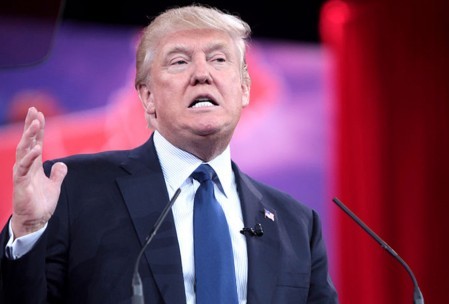Thus read the headline in the New York Times opinion piece bemoaning the rise of the current Republican frontrunner for the presidency. The article was spot-on to an extent, with its discussion of Donald Trump’s success coming in part as a result of Nixon’s Southern Strategem.
The author is not alone in blaming the Republican establishment for Trump’s rise. However, I think it’s possible to be more specific in who helped foster our current state of Trumpism. The G.O.P. may have carved out the niche for Trump, but evangelicals provided the force to thrust him into his current position as a legitimate candidate.
The evangelical voting bloc has been a powerful force in politics for the past 50 or 60 years. When one looks at the history of evangelical voters, it’s possible to see a stark change in perception from the early 20th century, the days of William Jennings Bryan when evangelicals were seen as crazy fundamentalists, to now, when evangelicals are still somewhat seen as crazy fundamentalists, but they’re also seen as an important political force. Evangelicals first came into play in the election of Jimmy Carter in 1976, who mobilized the bloc as it never had been before. In the wake of Nixon and the Watergate crisis, which left the voting populace disillusioned and distrustful of the presidency, Carter’s unabashed born-again Christianity was a refreshing change of pace that brought evangelicals out in droves. They finally had one of their own in office.
This honeymoon period was not to last, however. Before long, Carter found that he was no longer considered one of their own. In Randall Balmer’s excellent biography of Jimmy Carter, he describes this quite aptly in linking it to the Gospel verse: “He came unto his own, but his own received him not.” Over the course of the Carter presidency, forces arose which began to convince evangelicals that Carter was not evangelical enough. The New Religious Political Right sought to hitch evangelical conviction to the Republican agenda such that the two grew to be inseparable. Phrases such as “secular humanist” were thrown around to demonize Carter, whether they were true or not. Reagan came on the scene and learned to talk the talk, whether he walked the walk or not. While uncomfortable with born-again language, he learned to speak it and thus earned the evangelical vote to trounce Carter in the 1980 election.
But even Reagan proved to disappoint evangelicals. Time and again, evangelicals coalesced around a candidate who would be one of their own, only to find a reason to grow angrier.
And now we arrive at the 2016 election. In this election, we have Ted Cruz, the son of an evangelical minister (who was a state board member for the Religious Roundtable) and an evangelical firebrand in his own right, whose political speeches sound like sermons and who espouses conservative evangelical values that would have won him the 1980 election in a heartbeat. But the evangelicals of today are not the evangelicals of 1980. Even Cruz doesn’t stand a chance in the face of the anger which has taken hold of the American populace. Once again, we see evangelicals willing to compromise on conviction for the sake of correcting the wrongs they see in this country. Trump may not be the most devout candidate in the race (“Two Corinthians walk into a bar …”), but he is the angriest and the loudest. Like Reagan, or at least Reagan’s advisors, Trump has read the room and played to the people’s fears and frustrations. He talks enough about religion to keep evangelicals comfortable, and he’s won over evangelicals in every state save for Iowa.
I feel the need to add a disclaimer that, obviously, I do not mean that every evangelical is at fault for Donald Trump. I count myself among the ranks of evangelicals and do not wish to demonize them. I am simply saying that we should not ignore the fact that, for some, born-again identity has been supplanted by party affiliation.
So, yes, the G.O.P. helped create Trump. But, we can’t neglect the way in which evangelicals have helped him along.

